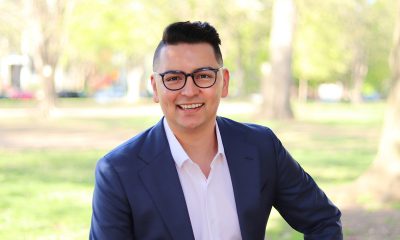Opinions
D.C. Office on Aging failing our LGBT elders
Culturally specific programs needed for at-risk residents
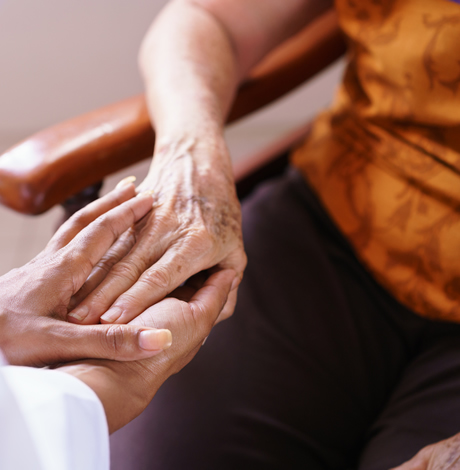
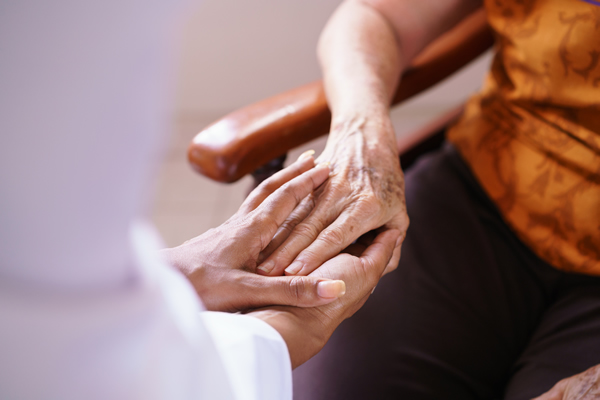 Older LGBT adults have lived through decades of severe discrimination that many young queer people like myself will never experience firsthand. Yet as mainstream LGBT advocacy marches onward, full of images of attractive young people at Pride parades, the older LGBT people who paved the way for the rights many of us now enjoy are being completely ignored.
Older LGBT adults have lived through decades of severe discrimination that many young queer people like myself will never experience firsthand. Yet as mainstream LGBT advocacy marches onward, full of images of attractive young people at Pride parades, the older LGBT people who paved the way for the rights many of us now enjoy are being completely ignored.
The lingering effects of previous decades of discrimination continue to create severe problems for older LGBT adults. Yet, even in oh-so-progressive Washington, D.C., the D.C. government’s Office on Aging has been willfully ignoring and failing to support LGBT residents in the District. The Office on Aging’s mission states that it exists to support older adults in D.C. (defined as those 60 and older), persons living with disabilities, and their caregivers. A recent request under the Freedom of Information Act revealed that, although 10 percent of the D.C. population identifies as LGBT, in 2014 and 2015 LGBT people made up less than 1 percent of those receiving services from the various agencies funded by the D.C. Office on Aging. This imbalance cannot be ignored— it shows that the D.C. Office on Aging is critically failing to fulfill its mission and support LGBT adults in D.C.
The Office on Aging’s failure to provide adequate services for LGBT older adults is part of a systematic problem across the U.S. — SAGE (Services and Advocacy for GLBT Elders) cites a recent study suggesting that a whopping 96 percent of America’s social service and caregiving agencies do not provide any services specifically for LGBT older adults. These statistics are incredibly troubling — LGBT people are one of the most vulnerable populations among older adults in the United States, yet are being seriously underserved.
Older LGBT adults experience a variety of severe vulnerabilities, which makes the Office on Aging’s failure to serve them even more distressing. First, LGBT older adults tend to face a unique social isolation: LGBT elders are twice as likely as their non-LGBT peers to live alone, twice as likely to be single, and three to four times less likely to have children — and many are estranged from their biological families. This lack of support is associated with higher levels of depression, suicide and substance abuse among older LGBT adults as compared to their non-LGBT peers. Furthermore, many LGBT older adults face poverty and financial insecurity because of a lifetime of employment discrimination. With older LGBT adults facing vulnerabilities that are this frequent and severe, it is critical that support agencies like the Office on Aging act immediately to support LGBT adults.
To be sure, there are challenges in engaging LGBT older adults in social services. Older LGBT adults are less likely to access mainstream elder services because of fear that they will experience prejudicial treatment— a fear that is quite justified, considering that an estimated 46 percent of social service and caregiving agencies in America claim that LGBT older adults would be unwelcome at senior centers in their areas (“Invisible Individuals,” Florence Gelo). It is therefore necessary that agencies like the Office on Aging conduct specific outreach to LGBT older adult populations, and provide them high-quality, evidence-based services.
It is also vital that the Office on Aging provide services specifically for older LGBT adults. A common excuse from agencies that fail to provide LGBT-specific services is that their services are “open to all”— that LGBT older adults would be welcome in the programs already in place, and therefore that LGBT-specific programs aren’t necessary. This sentiment willfully ignores the reality that when elder services are not LGBT specific, LGBT older adults are likely to either hide their sexual identity or avoid the program (“Research on Aging” Porter and Cahill 2014).
Culturally specific programs have been proven time and again to be the most effective practice for agencies serving older adults. The Office on Aging has no problems providing culturally specific programing for non-LGBT cultures and communities, and they need to give LGBT culture and community the same acknowledgement and respect as any other culture.
Whether you’re a young LGBT person like me, an older LGBT adult, or any LGBT ally, this treatment of our LGBT elders should outrage you. I hope the D.C. Office on Aging will recognize how serious its failure is to serve the LGBT community, and take action immediately to support the vulnerable and underserved population of older LGBT adults in D.C.
Anna Coughlan is an intern with the DC Center for the LGBT Community, and a student at George Washington University studying Human Services and Social Justice.
Opinions
On Pope Francis, Opus Dei and ongoing religious intolerance
Argentine-born pontiff died on Monday

“Good Friday” set the stage for Saturday’s anti-Trump/MAGA “Hands Off” protests serving as a timely lead-in to binge-watching Alex Gibney’s two-part HBO political documentary, “The Dark Money Game” on Easter Sunday. In “Wealth of the Wicked,” nefarious Opus Dei —Svengali Leonard Leo strategically seduces politically disappointed Catholic Federalist Society billionaires into subsidizing a scheme to ‘pipeline’ malleable conservative judges to take over the Supreme Court and overturn reproductive rights.
A key victory for “Operation Higher Court” came in 2010 when SCOTUS ruled 5-4 in Citizens United v Federal Election Commission, that corporations and unions have the same First Amendment free political speech rights as individuals — as long as their unlimited cash donations go to 501 c(4)’s or Super PAC slush funds and not directly to candidates. Twelve years later, in 2022, they got their payoff with the overturning of Roe v Wade by Leo-promoted Catholic justices.
But Leo’s political conniving is not the only exploitation of moral corruption. The documentary exposes conservative Christians too.
Gibney’s anti-hero is a former rabid anti-abortion lobbyist named Rev. Robert Schenck. He tells of turning to a fellow conservative in Cleveland, Ohio after Trump won the Republican presidential nomination in 2016 and asking: “Are we really going to do this? We’re going to choose this man who’s inimical to everything we believe?” The other evangelical replied: “I don’t care how bad he is. He’s going to get us the court we need.’”
Schenck explains the unholy alliance between Christian conservatives and Big Business. “Whenever you talked about government regulation, the argument was eventually — ‘these same characters who control my business are going to start trying to control your church. So, it’s in your best interests that we defang this monster’ — and that brought a lot of religious conservatives over.”
And there’s this: “We have a little aphorism built on a Bible verse: ‘The wealth of the wicked is laid up for the righteous.’ So, yeah, let’s baptize the billionaires’ money. We can do that — and it eventually brought together this alliance.”
Schenck later reveals an intense epiphany that resulted in regret for how much harm he caused. Not so for Leo.
This is an excerpt from Gareth Gore’s comprehensive book Opus, for Rolling Stone Magazine:
“DURING THE DONALD TRUMP YEARS, conservatives — led by Leonard Leo — took control of the Supreme Court … At one Federalist Society event, his good friend Supreme Court Justice Clarence Thomas jokingly referred to Leo as the third most powerful man in the world, presumably behind the pope and the president of the United States.”
On Monday morning, Pope Francis died. I liked this pope, compared to the others. I covered Creating Change during the AIDS crisis when author Paul Monette delivered his brilliant, scathing denouncement of the Catholic Church, then unexpectedly ripped up a portrait of Pope John Paul II. Pope Benedict XVI was just crotchety cruel. But Pope Francis — named for St. Francis of Assisi — had that big smile and genuinely seemed to care about migrants, the vulnerable and the marginalized — like us. He even used the word ‘gay’ instead of ‘homosexual.’
Pope Francis’s reply to a question about a Vatican “gay lobby” on a flight from Rio de Janeiro to Rome made global news. “If a person is gay and seeks God and has good will,” he said in 2013. “Who am I to judge? We shouldn’t marginalize people for this. They must be integrated into society.”
What did this mean? Welcoming inclusion into a family that officially considers us ‘intrinsically disordered?’
And then there was Pope Francis’s interaction with Juan Carlos Cruz — a whistleblower in Chile’s clerical sex abuse scandal.
“He said, ‘Look Juan Carlos, the pope loves you this way. God made you like this and he loves you,'” Cruz told The Associated Press.
Meanwhile the Catholic Church Catechism affirmed, “this inclination, which is objectively disordered, constitutes for most of them a trial.”
Ergo, a behavioral choice.
Therein lies the problem.
LGBTQ people are seen largely as individuals with sinful same sex sexual ‘inclinations.’ So when the pontiff touted ‘the equal dignity of every human being,’ and rebuked Vice President JD Vance with the ‘Good Samaritan’ parable, whereby love “builds a fraternity open to all, without exception” — we are still the exception.
Francis was all also human — having to apologize at one point for using a gay slur. But what of the bigger things like, did he know about the Opus Dei takeover of the U.S. Supreme Court when he chastised Vance about deporting migrants? Did he know that the Archdiocese of Los Angeles agreed to pay $880 million to 1,353 people last October, who allege they were victims of clergy sexual abuse? With a previous payment of $740 million, the total settlement payout will be more than $1.5 billion dollars. Is Leo chipping in to replenish that?
And it’s not over. Earlier this month, Downey Catholic priest Jaime Arriaga, 41, was charged with several counts of child sexual abuse which allegedly happened when he was serving as a transitional deacon at the Our Lady of Perpetual Help Church.
Longtime U.K LGBTQ+ activist Peter Tatchell — who’s campaigned against Catholic homophobia for 58 years — says Pope Francis’ legacy is complicated.
“I extend my condolences to Catholics worldwide on the passing of Pope Francis. While we often disagreed on issues of LGBTQ rights, I acknowledge his more compassionate tone towards sexual minorities. His recent moves to allow blessings for same-sex couples, albeit with limitations, signaled a small but significant shift in Church doctrine,” Tatchell said in a statement.
“However, for millions of LGBT+ people globally, the Catholic Church remains a force for discrimination and suffering. Under his leadership, the Vatican continued to oppose same-sex marriage and trans rights. Catholic bishops lobbied against the decriminalization of homosexuality in many parts of the world. The Vatican still upholds the homophobic edicts of the Catechism, which denounces the sexual expression of same-sex love as a ‘grave depravity’ and ‘intrinsically disordered.’ Francis’s legacy is, therefore, a mixed one — offering some progress, but leaving deep-rooted inequalities largely intact.
“The struggle for LGBT+ equality against a homophobic church must continue. We urge the next Pope to go further — to end the church’s support for discrimination, both within the faith and in the wider society.”
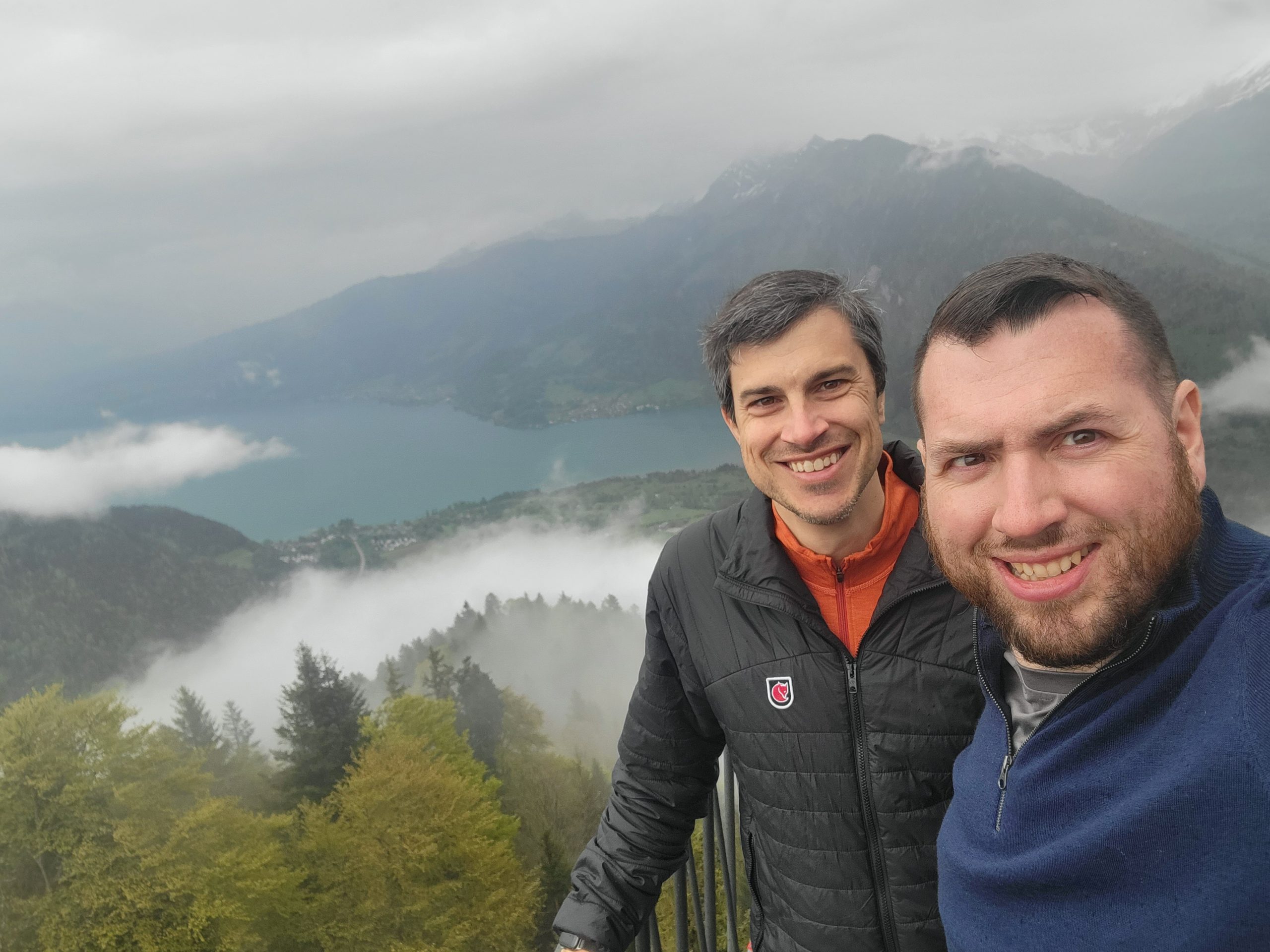
Brad Tennis loves running. For years, the meditative rhythm of his feet on pavement brought him peace like nothing else could. And it turns out, he was quite good at running as he even qualified for the Boston Marathon. But while Brad was chasing his goals, unbeknownst to him, his heart was slowly deteriorating.
In November 2018, out of the blue, Brad was diagnosed with arrhythmogenic right ventricular cardiomyopathy or ARVC, a rare heart condition that causes the heart muscle to break down over time. ARVC increases the risk of abnormal heartbeats and chance of sudden cardiac death. Brad was fitted with an internal defibrillator and told he could no longer run. Doctors warned him that endurance exercise would only accelerate the disease.
After processing the news of this condition, Brad felt like himself for a while. But in 2020, he started experiencing Implantable Cardioverter-Defibrillator (ICD) shocks to halt life threatening arrhythmias. Despite numerous surgical and medical interventions, the shocks began to get more frequent. By 2023, the toll of the disease, the ICD shocks and the treatments led to progressing heart failure. By the end of 2023, he was feeling breathless on stairs, having trouble playing physically with his children and finding it difficult to keep up at work. His world was shrinking.
In February 2024, Brad started the process with Johns Hopkins Hospital to be listed for a heart transplant. A couple of weeks later, he had another shock, more testing and then a doctor put him on ECMO (extracorporeal membrane oxygenation), a life support machine that is used when a person’s heart is failing. Soon after, he got the news of a lifetime: “There’s a heart available and today is the day!”
The organ transplant marked the beginning of a new journey. Brad focused on recovery — building up his strength, learning his new body and adjusting to life with a new heart. Last summer, he was cleared to exercise again and is enjoying playing with his kids — something he deeply missed.

“I would never say I’m back to feeling normal. I’m always going to have to carefully manage my stress and my activities to protect my health and my new heart,” said Brad. “But the transplant was lifesaving and means that I will be there to build a life with my husband and my kids.”
Brad is still moving forward. He and his family are enjoying life again — and he’s even bought a new pair of sneakers with the hope that he’ll be able to return to running regularly.
“Organ donation and transplant have reopened doors that I had thought were closed forever,” Brad shares. “It’s given me the chance to be present and have a full, happy life with my husband, son and daughter.”
His husband, Drew, adds, “Every day, I’m reminded of Brad’s strength, resilience and bravery.”
Brad doesn’t take this lifesaving gift for granted and is grateful to his organ donor hero. “I think it’s an amazing thing — to give life and give hope. Even in tragedy, someone gave me a gift… a second chance. Everyone can register to be a donor and save lives like Brad’s at infinitelegacy.org.
Commentary
Fight against TERFs goes global
UK Supreme Court on April 17 ruled legal definition of ‘woman’ limited to ‘biological sex’
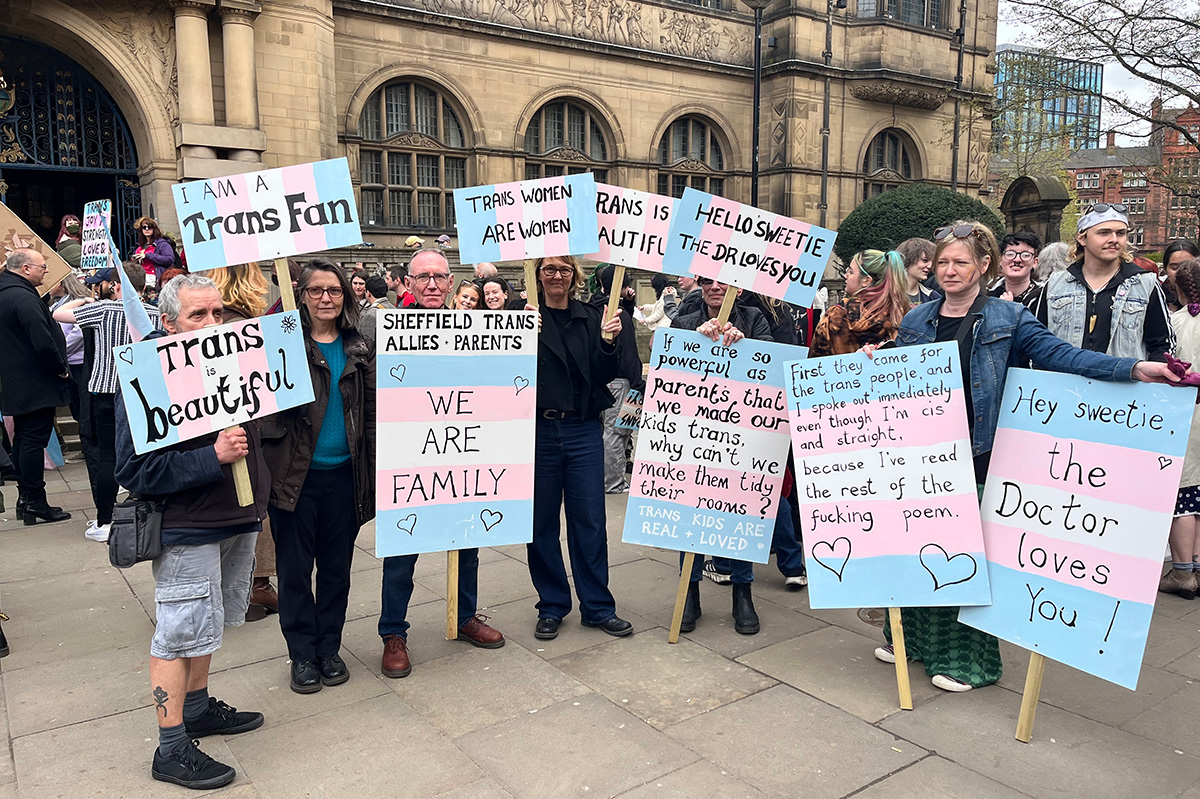
After last week’s U.K. Supreme Court ruling that reduced the legal definition of “woman” to “biological sex,” footage of a group of women celebrating the decision with champagne spread virally across the media. These women are known as trans-exclusionary radical feminists, or TERFs.
In response, thousands of transgender people and their allies — including parents, siblings, and pro-trans celebrities — flooded the streets of London, Sheffield, Manchester, Cardiff, and other cities across the U.K. on April 19, to protest the erosion of trans rights. The fight between TERFs and trans* people have become more visible to those outside of the British LGBTQ+ community.
But this isn’t just about the U.K. The problem has gone global. For me, as an openly trans person who has lived in four different countries, it feels deeply personal.
For years, British TERFs have been spreading misinformation about gender around the globe, collaborating with far-right politicians and inspiring anti-trans violence.
At a pro-trans protest I attended in Sheffield, one of the speakers, Sofia Alatorre, a trans woman from Mexico now living in the U.K., dedicated her speech to the ways British TERFs, with their powerful movement supported by celebrities, such as “Harry Potter” author JK Rowling, are influencing people in South America.
“When I go to Mexico now, I don’t just hear people talking about transsexuals as degenerates anymore. Instead I hear about what bathroom we should use, or whether we belong in sports,” Sofia told the Washington Blade. “These are not lines that come from Mexico. They are finely crafted narratives designed to drive a wedge by weaponizing ‘common sense’ gut reactions to complicated subjects. Because without these, they’d have to face the uncomplicated reality: We are just people trying to live our lives happily. In the U.K., the entire media infrastructure is sympathetic with ‘gender critical’ TERF ideology to the point that sympathy blurs into outright support. With these lines finding footing in the Global South, it seems clear that the U.K. has become an exporter of transphobia.”
Unfortunately, TERFs even showed up at a trans event, attempting to argue with the speakers.
One of the trans* organizers of the Sheffield demonstration, who preferred to remain anonymous, expressed their love for the trans* community and trans* people. They emphasized that they are not expressing hatred toward TERFs — they simply want them to reconsider their position.
“If you’re a TERF and reading this, we don’t hate you,” they said. “We don’t hate you. There is nothing I hold in my heart but deep pity for you. You do not know the community of love that we have as transsexuals, and you only know your community of hatred. If you are tired of feeling nothing but hate, come and talk to us, we’re nice, I promise. This protest is a rallying cry that we can’t lose, that we are all here for each other, and that we can do whatever the f*ck we want when we work together. We may be out here today in rage, but what keeps us alive is love.”
But it doesn’t seem like TERFs are ready to show love toward trans people — or to see trans women as their sisters. At our local protest in Sheffield, they were so agitated, jumping toward speakers and trying to engage with them, that the police had to intervene and remove them to prevent a fight. It reminded me of TERFs’ behavior I encountered in St. Petersburg, Russia, and in Russian-language online spaces.
Unfortunately, it’s not just South America that has been influenced by UK TERFs. The country I currently live in is known within European and U.S. queer communities as “TERF Island.”
Some trans Americans even avoid traveling to the U.K., afraid of the influence that Rowling holds over millions due to her wealth and cultural impact.
In Russia, Ukraine, and other Eastern European countries, so-called “radical feminism” is the most prominent feminist movement. Radical feminism, which emerged in the 1960s, is based on the belief that patriarchy is the root of all other forms of oppression.
In modern Eastern Europe, this has led to a situation where many feminists fail to acknowledge racism, ableism, and transphobia — excluding everyone except cisgender people, Slavic, atheist, and able-bodied people from their movement. Historically, radical feminists have not focused much on the trans* community, but with the rise of trans* activism in the 2000s, many became fixated on targeting trans people.
Many of my Russian-speaking trans friends have been badly bullied by local TERFs. Some even experienced suicidal thoughts and severe anxiety due to online harassment from them. And these TERFs weren’t developing their ideology locally — they were importing it. The anti-man rhetoric was inherited from American prominent radical feminists like Andrea Dworkin and Ti-Grace Atkinson, while the transphobic elements were “exported” to Eastern Europe, primarily from the U.K. and specifically Scotland.
Even before Rowling, there was Magdalen Berns, a Scottish TERF YouTuber who was extremely popular among Russian girls and women. It was Berns who helped bring Rowling into anti-trans activism.
I spoke with Sophie Molly, a Scottish trans activist and politician who ran as an Independent MP candidate in the 2024 U.K. general election for the Aberdeen South constituency.
TERFs ruthlessly harassed her during her campaign.
“Transphobia is institutionalized in the UK. It is systemic and it’s getting worse with each passing day” she told me. “Local TERF have a slew of legal professionals on their team too. Like Sarah Phillimore and Joanne Cherry. TERFs have been continually lobbying the government to oppress trans and gender non-conforming people. Dragging their rights and freedoms through the courts. All under the pretense of protecting the rights of women. In reality these conservative groups are backed and funded by billionaires. Billionaires that want to remove trans people from public life, due a personal prejudice they hold. The majority of TERFs are wealthy and privileged white women. Most of them are not LGBTQIA+. They have obscene amounts of money to spend on persecuting a tiny minority. Trans women are women — no matter what the U.K. Supreme Court dictates.”
But another problem of TERFs is that they are policing women as well. Even the Supreme Court decision targeted women.
“The [Supreme Court] decision is an attack on the rights of both trans people and women,” Sophie said. “It reduces women to their anatomy, which is extremely regressive and misogynistic in my opinion”
Women for decades have fought to ensure their lives wouldn’t be defined by the sexual organs they were born with. TERFs are now doing exactly that — attempting to reduce womanhood to biology, while also dictating how women should behave, all in the name of “sisterhood.”
Modern British TERFs have received support from figures like musician, far-right influencer, and convicted murderer Varg Vikernes, as well as ultra-conservative organizations such as the Russian Orthodox Church, an institution notorious not only for justifying the war in Ukraine with homophobic rhetoric but also for its long history of opposing women’s rights. This kind of “feminism” is a global threat, not only to trans* people but also to girls and women everywhere.
Editor’s note: The author uses trans* in order to be inclusive of nonbinary and gender queer people.





